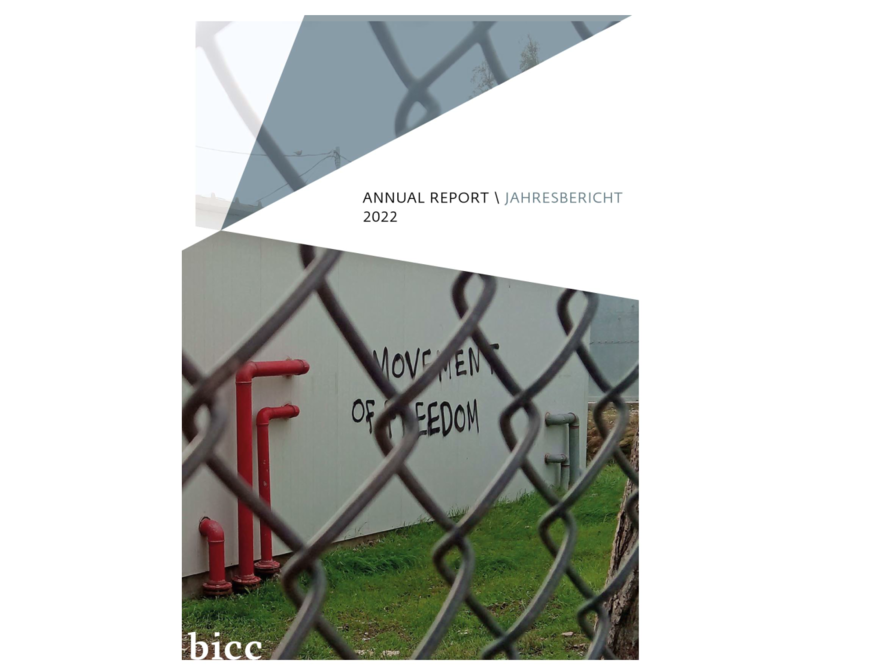Press releases
BICC Annual Report 2022
The Annual Report 2022 presents empirical research conducted by BICC (Bonn International Centre for Conflict Studies) in regions characterised by violent conflict and its aftermath, forced migration dynamics and arms proliferation. Besides Ukraine, these include Afghanistan, Yemen or the Sahel.

The Report also reflects the transfer of BICC’s academic expertise in policy and practice, such as in its cooperation with the African Union and the United Nations.
The essay of the Annual Report 2022 by BICC researcher Dr. Zeynep Şahin-Mencütek is entitled “Humanitarian Emergency and European Migration Policies: What can we Learn from the War in Ukraine?” . So, BICC’s Annual Report 2022 shows, among other things, how researchers investigate forced displacement and refugee movements in Africa, Asia and the European Union on this basis or look at the nexus between humanitarian aid, development cooperation and peacebuilding.
An important part of BICC’s Annual Report 2022 is the topic of “Dynamics of Violent Conflict”. Researchers advise the United Nations on the disarmament, demobilisation and reintegration of violent actors. Based on field research, they analyse conflict dynamics in Donbas and other (post-Soviet) de facto regimes, in Afghanistan and Mali. “Even a state like North Rhine-Westphalia is not immune to violent Islamist or right-wing extremist actors,” explains Conrad Schetter. This is why the Annual Report presents the coordination unit for the research network CoRE-NRW (Connecting Research on Extremism in North Rhine-Westphalia) at BICC, which is supported by the NRW Ministry of Culture and Science.
The 2022 Annual Report also addresses BICC’s cooperation with the African Union and other regional organisations to improve small arms control on the continent. “BICC is proud to be part of the development process for a new weapons legislation in Ghana, in cooperation with these partners, which is exemplary not only for Africa”, Conrad Schetter highlights this particular aspect in BICC’s working area of “Armament and Arms Control”.
The essay of the Annual Report 2022 by BICC researcher Dr. Zeynep Şahin-Mencütek is entitled “Humanitarian Emergency and European Migration Policies: What can we Learn from the War in Ukraine?” . So, BICC’s Annual Report 2022 shows, among other things, how researchers investigate forced displacement and refugee movements in Africa, Asia and the European Union on this basis or look at the nexus between humanitarian aid, development cooperation and peacebuilding.
An important part of BICC’s Annual Report 2022 is the topic of “Dynamics of Violent Conflict”. Researchers advise the United Nations on the disarmament, demobilisation and reintegration of violent actors. Based on field research, they analyse conflict dynamics in Donbas and other (post-Soviet) de facto regimes, in Afghanistan and Mali. “Even a state like North Rhine-Westphalia is not immune to violent Islamist or right-wing extremist actors,” explains Conrad Schetter. This is why the Annual Report presents the coordination unit for the research network CoRE-NRW (Connecting Research on Extremism in North Rhine-Westphalia) at BICC, which is supported by the NRW Ministry of Culture and Science.
The 2022 Annual Report also addresses BICC’s cooperation with the African Union and other regional organisations to improve small arms control on the continent. “BICC is proud to be part of the development process for a new weapons legislation in Ghana, in cooperation with these partners, which is exemplary not only for Africa”, Conrad Schetter highlights this particular aspect in BICC’s working area of “Armament and Arms Control”.


